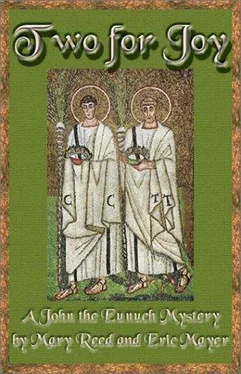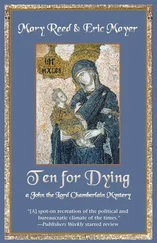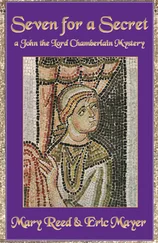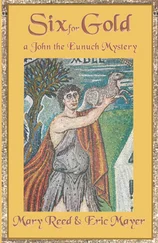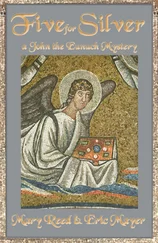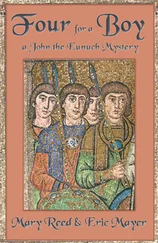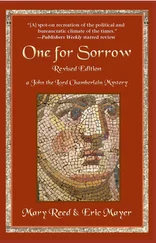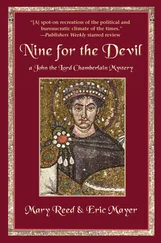Mary Reed - Two for Joy
Здесь есть возможность читать онлайн «Mary Reed - Two for Joy» весь текст электронной книги совершенно бесплатно (целиком полную версию без сокращений). В некоторых случаях можно слушать аудио, скачать через торрент в формате fb2 и присутствует краткое содержание. Жанр: Исторический детектив, на английском языке. Описание произведения, (предисловие) а так же отзывы посетителей доступны на портале библиотеки ЛибКат.
- Название:Two for Joy
- Автор:
- Жанр:
- Год:неизвестен
- ISBN:нет данных
- Рейтинг книги:5 / 5. Голосов: 1
-
Избранное:Добавить в избранное
- Отзывы:
-
Ваша оценка:
- 100
- 1
- 2
- 3
- 4
- 5
Two for Joy: краткое содержание, описание и аннотация
Предлагаем к чтению аннотацию, описание, краткое содержание или предисловие (зависит от того, что написал сам автор книги «Two for Joy»). Если вы не нашли необходимую информацию о книге — напишите в комментариях, мы постараемся отыскать её.
Two for Joy — читать онлайн бесплатно полную книгу (весь текст) целиком
Ниже представлен текст книги, разбитый по страницам. Система сохранения места последней прочитанной страницы, позволяет с удобством читать онлайн бесплатно книгу «Two for Joy», без необходимости каждый раз заново искать на чём Вы остановились. Поставьте закладку, и сможете в любой момент перейти на страницу, на которой закончили чтение.
Интервал:
Закладка:
“But he who has seen the Lord is armored even against the serpent’s fangs,” Peter put in, making his religion’s mystical sign.
“I prefer your servant’s culinary efforts to his philosophy,” Philo muttered to John.
“Yet if it were not for Matthew’s token, which you administered to me yourself, I would not be here to cook for you,” Peter pointed out sharply.
Philo sniffed. “Yes, well, that was an interesting coincidence, wasn’t it? Perhaps the foulness of the medication revived you? But to resume my tale, after several years’ journey along a regular thoroughfare of vermin-infested caves and ruins, Gregory finally found his way to Constantinople, where no doubt he found himself immediately surrounded by more snakes than populate the deserts of Arabia and all equally deadly, despite possessing legs.”
John smiled thinly. “And concerning Luke?”
“He arrived here more recently than Gregory, who ascended his pillar about four years ago. I wasn’t able to learn what Luke did before he took up mortification of the flesh but I did ascertain that he began his vocation near Antioch. A man who owned extensive olive groves there awoke one morning to find that someone had erected a column during the night on his land, something of a wonder in itself if you ask me given the short time available. But in any event, the sun rose and there sat Luke, already in residence atop the column.”
“It was a great honor to the olive grove owner,” Peter protested.
“He was outraged, apparently,” snapped Philo, without deigning to look at the servant, “and no wonder. You can’t have strangers taking up residence on your property on a whim, after all. But before he was able to convince the appropriate authorities of the necessity of investigating the matter, the silver-tongued stylite-for that is what they called him, Luke of the silver tongue-had begun to attract large and potentially riotous crowds.”
“Wherever there’s a crowd of followers, there’s always the possibility of a riot,” agreed John, thinking of the crowds outside the shrine where Michael and his acolytes were encamped. “But what was the outcome?”
Peter, who had finished ordering the shelves and was now wiping the steamy window panes clean, jumped into the conversation once again. “I have heard that the olive grove owner underwent a change of heart and became one of Luke’s followers.”
“More likely the authorities made the stylite’s tenancy worthwhile to the landowner,” countered Philo. “It’s remarkable what these stylites can get away with, really it is. In fact, since neither Senator Aurelius nor anyone else in this city seems to perceive a need for my services, perhaps I should climb up one of those recently vacated columns and earn a crust by preaching to the multitudes.” He finished his honey cake. “I will admit that asceticism, in moderation, is not to be derided. It is considered a virtue by nearly all philosophies and one I try to practice myself.”
“I am glad to hear it,” said Peter, whisking the platter of cakes away from Philo’s descending hand.
“Philo perched atop a column, preaching about beauty to a crowd of unwashed pilgrims? Now that’s something I’d like to see! In fact, I’d gladly pay my father to continue refusing his entreaties for aid just to witness such a spectacle. Or rather, I would suggest such payment if I could maintain a civil conversation with the august Senator Flavius Aurelius long enough to make the offer.” Anatolius ran a hand irritably through the unruly black curls of his still-damp hair as he and John emerged from the Baths of Zeuxippos. Behind them, a faint fog of steam escaped through the uncovered gymnasium in the center of the sprawling building, coiling up into a gray, leaden sky.
Anatolius shivered. “This cold is unseasonable,” he complained. “Perhaps the Christians’ god wasn’t angry at those stylites but just wanted to warm his hands.”
The sight of the Great Church facing them across the square apparently struck him as a rebuke, because he added quickly, “You truly believe this Michael could have caused their horrible deaths?”
John, who had related the results of Philo’s investigations to Anatolius, nodded. “Caused them, or, if not, has certainly sought to take advantage of them.”
“But this first message you mentioned, didn’t it predict their deaths?”
“So Justinian said. Unfortunately, I have been unable to read the letter itself, nor am I likely to, since the emperor apparently construed my request to inspect it as a direct criticism of his powers of description.”
“And once he has spoken on a matter it is closed. Not unlike my father,” Anatolius replied with a scowl. “But surely the emperor can read well enough? Why do you suppose that he overlooked some important fact or other?”
“It’s been my experience that the most magical aspect of prophecies is how much clearer they appear in retrospect. There might have been something useful to be gleaned by examining that letter.”
They had crossed the square and were now walking down a street behind the Great Church.
“I shall be going home momentarily,” John continued, “but first I wanted to inspect where Philo stumbled across the dead beggar. Felix gave me directions this morning, having got them from Darius, who, by the way, says that on your last visit to Isis’ house a certain composition was very well received. I understand her girls are all hoping you will write poetry for them too. You seem to be quite a popular young man with the ladies, Anatolius.”
Anatolius, who appeared preoccupied, muttered a noncommittal comment. He tended to be intolerably voluble during one of his frequent periods of longing after a lady, but when his love was requited he became belatedly discreet. This consummation occurred far less frequently than anyone would have guessed, given his rank, poetic turn of mind and a face that might have been chiseled by a sculptor of the classical era-one who wasn’t busy creating statues of wise old philosophers. But it was no puzzle to John, who had observed over the years how his friend invariably set his heart on women who were either hopelessly below or too far above him in the city’s stratified society and therefore well out of reach.
One day, John feared, Anatolius would suffer the misfortune of actually making an unsuitable match.
They passed through a small forum where one of the city’s ubiquitous stylites still preached, for the mysterious deaths of the three had not come near to even decimating their population. Soon they plunged into one of Constantinople’s countless narrow byways. There was a lingering aura of darkness about it, as though the previous night had not quite seeped away but remained puddled along the base of the walls hemming in its narrow length. They paced up and down for a time, kicking at reeking piles of refuse that yielded up only a few outraged rats.
Anatolius asked John what it was that he sought.
“I don’t know. The poor die in alleyways all the time. I thought if I examined…” John’s voice trailed off. “Nothing suggests itself, I’m afraid.”
A moment or so later they had regained the sunlight. John’s spirits lifted somewhat as he recounted what Felix had imparted when he stopped briefly at John’s house that morning, not long after Philo had completed detailing his investigations.
“According to the information Felix received, no one in the vicinity of the columns saw anything out of the ordinary when the stylites burst into flame-unless you count a brawl between a Blue and a Green a few hours before not far from where Luke stood, although you could hardly call that out of the ordinary.”
Anatolius laughed. “In other words, Philo has thus far uncovered about as much useful information as the captain of the excubitors and all his informants and in a shorter time. Perhaps my father could use Philo’s services after all-to spy on me! He may uncover some shortcomings I have as yet unguessed!”
Читать дальшеИнтервал:
Закладка:
Похожие книги на «Two for Joy»
Представляем Вашему вниманию похожие книги на «Two for Joy» списком для выбора. Мы отобрали схожую по названию и смыслу литературу в надежде предоставить читателям больше вариантов отыскать новые, интересные, ещё непрочитанные произведения.
Обсуждение, отзывы о книге «Two for Joy» и просто собственные мнения читателей. Оставьте ваши комментарии, напишите, что Вы думаете о произведении, его смысле или главных героях. Укажите что конкретно понравилось, а что нет, и почему Вы так считаете.
